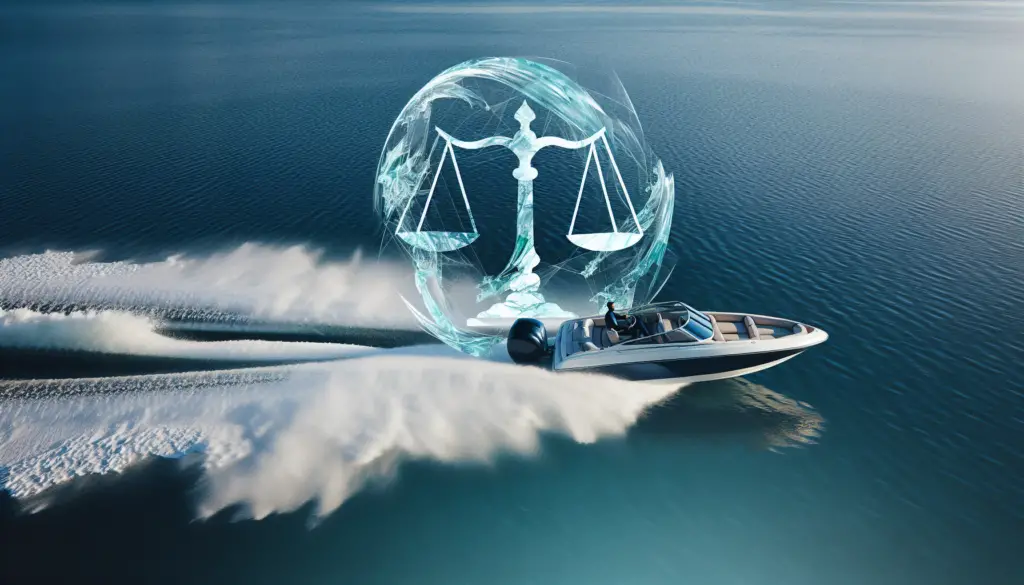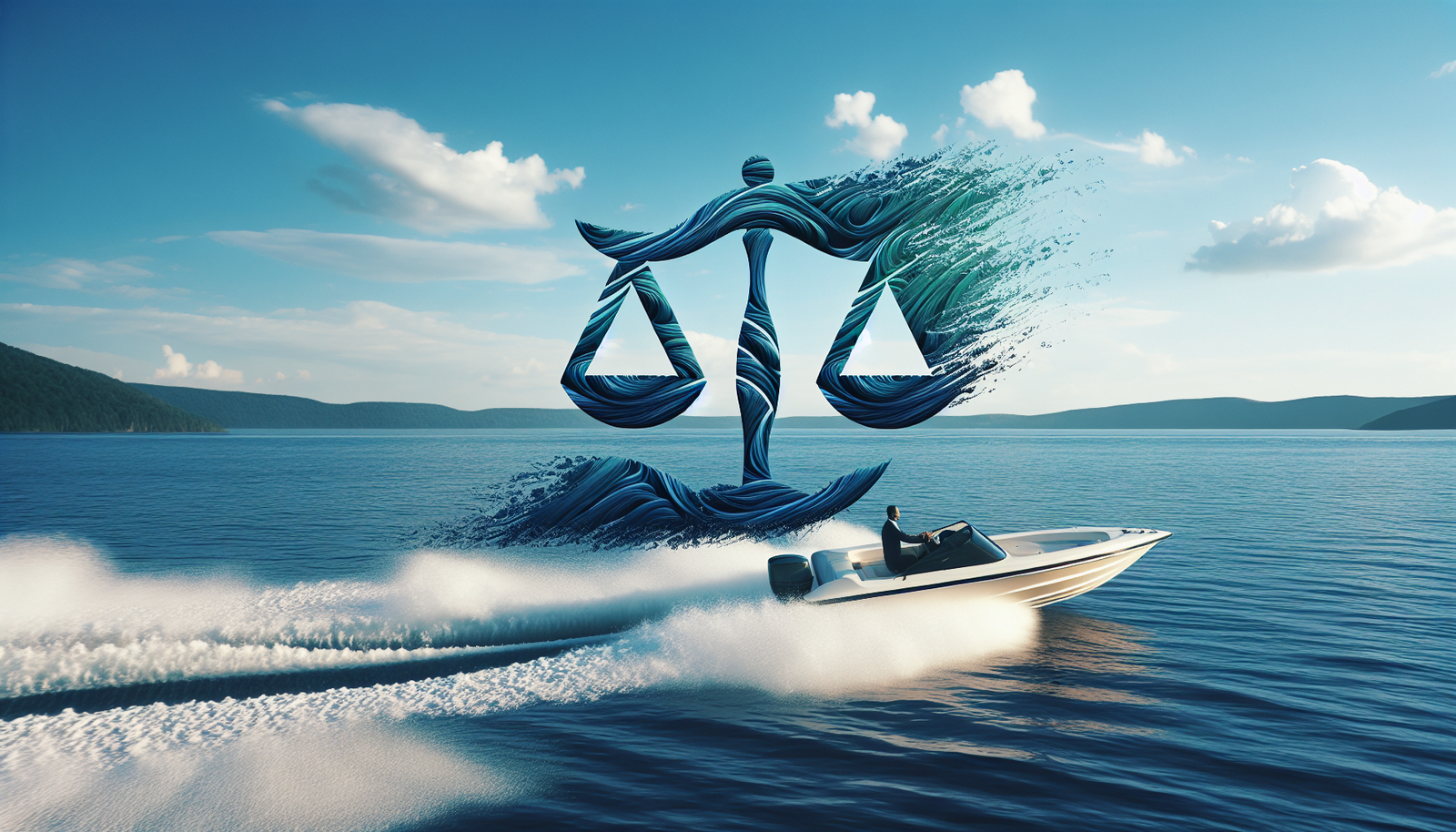Picture it. The sun is setting, painting the sky with hues of gold and purple. You’re on a boat in the middle of a serene lake, the cool wind gently rustling your hair. But this peaceful day on the water can quickly turn into a nightmare if alcohol is added to the mix. This is the point where “Boating Under The Influence: Laws and Consequences” comes into play. Consider it your guide where you’ll find the tighter, legal laces strung around boating under the influence, a surprising reality many ignore. By the end, you’ll understand the severe ramifications, both legally and personally, that can result from this often-overlooked transgression.

Understanding BUI
Venturing on the open seas, the wind rushing through your hair, and the exhilarating feeling of freedom are all parts of the allure of boating. However, such an experience also comes with significant responsibilities, one of which is understanding and abiding by BUI laws.
Definition of Boating Under the Influence
You might be asking, what exactly is BUI? Boating Under the Influence (BUI) is primarily defined as operating a vessel while under the influence of alcohol, drugs, or other intoxicants. Similar to its equivalent on land, driving under the influence (DUI), both offenses are seriously taken, and have similar base limits regarding the legal blood alcohol concentration level.
Comparison with DWI/DUI
Now, you might wonder, is there any difference between a BUI and a DWI/DUI? As it turns out, while there are similarities, there are also key differences. Both involve operating a vehicle under the influence of an intoxicant, but the environments and circumstances in which they occur differ—a DUI/DWI takes place on the road, and a BUI on the water. Each comes with its own unique risks, challenges, and laws.
Analyzing BUI Laws
Navigating BUI laws might seem as treacherous as navigating stormy seas. But much like understanding marine charts and weather patterns, understanding these laws can help you maintain the right course and stay out of trouble.
Federal BUI Laws
Ahoy! Federal BUI laws are important navigational aids you need to understand. The United States Coast Guard enforces these laws on all U.S waters, which include all seacoasts, and extends to any waters that are also accessible by land in any state.
State-specific BUI Laws
Anchor your attention here for a moment. In addition to the federal BUI laws, each state has its own specific BUI laws. These laws can vary and might encompass a wider variety of vessels, and have different penalties or procedures. It’s crucial that you familiarize yourself with the laws of the states where you’ll be boating.
International Laws on BUI
Ever considered boating in international waters? Then you should be aware of the International Convention of Standards of Training, Certification, and Watchkeeping for Seafarers (STCW). It has a zero-tolerance policy for operating a vessel under the influence of alcohol—meaning, internationally, the safest policy is to not drink and boat at all.
Why BUI Laws Are Crucial
No one wants to see their day of fun at sea turn tragic. That’s why these laws exist—they aim to prevent accidents caused by impaired operation of a boat.
Risks and Dangers of BUI
To appreciate these laws, you must first understand the risks and dangers of BUI. Boating under the influence can lead to negligence, accidents, and even fatalities—often innocent victims who just happened to be in the wrong place at the wrong time.
Effects of Alcohol on Operating a Boat
What can alcohol do to you while operating a boat? On the most basic level, alcohol can impair your judgment, balance, vision, and reaction times—key factors needed for safe boating. Add to this the environmental factors encountered while boating, such as sunshine and wind, and the effects can be exacerbated significantly.
Increasing Incidents of BUI
Here’s a red flag: there has been a rise in BUI incidents. According to the U.S Coast Guard, alcohol is a leading factor in boating deaths. This trend has led to increased enforcement and stricter penalties for BUI offenses.

Examples of BUI Offenses
You might be curious: what sort of behavior constitutes a BUI offense?
First-time BUI Offenses
First-time BUI offenses typically involve operating a boat while exhibiting signs of impairment, such as erratic boating behavior or failure of field sobriety tests—regardless of whether an accident occurred.
Repeat BUI Offenses
Repeat BUI offenses are, unfortunately, not uncommon. These involve multiple instances of boating under the influence, and usually carry harsher penalties, including mandatory jail sentences.
Aggravated BUI Offenses
Aggravated BUI offenses are very serious. They typically involve situations where an individual was operating a boat under the influence and caused serious bodily harm, death or extensive property damage. The penalties for these offenses can be severe and may include lengthy prison sentences.
Consequences of BUI
Aha! You’ve caught onto the fact that the consequences of BUI-fishing in troubled waters—are indeed severe.
Legal Consequences for BUI
Legal consequences for BUI can include fines, jail time, probation, or even the loss of boating privileges. The severity of these penalties largely depends on the nature of the offense, and they tend to become more severe with repeat offenses.
Personal and Social Consequences of BUI
BUI can lead to personal consequences. Beyond legal repercussions, BUI offenders may face shame, guilt, and damage to reputation. Personal relationships can become strained and society’s overall attitude towards the offender can change.
Professional Consequences of BUI
Lastly, the professional consequences of BUI shouldn’t be overlooked. Depending on your profession, a BUI conviction could lead to the loss of a job or license, hinder career advancement, and limit future employment opportunities.
Legal Process After a BUI Arrest
Now imagine you’re in the unfortunate situation of facing a BUI arrest. What should you expect?
Arrest and Detainment Procedures
When arrested for suspected BUI, you’ll likely be taken into custody for a sobriety test. This involves detention, booking, and potentially being held until sober or released on bail.
BUI Testing Methods
BUI testing methods typically involve field sobriety tests and chemical tests to check for the presence of alcohol or drugs. Refusal to submit to these tests might result in immediate penalties, including the suspension of boating privileges.
Appearing in Court for BUI
Finally, if you’re charged with a BUI, you’ll most likely have to appear in court. Here, you’ll need to respond to the charges, whether by pleading not guilty, guilty, or no contest.
Mitigating BUI Charges
“You’ve made your bed, now lie in it” doesn’t always hold water when it comes to BUI charges. There are ways to potentially mitigate these charges.
Legal Defenses against BUI Charges
Legal defenses against BUI charges could include arguing that the officer didn’t have a legal reason to stop you, challenging the accuracy of the sobriety tests, or claiming that the officer didn’t properly administer the sobriety tests.
Diversion Programs for BUI Offenders
Diversion programs might be available that can give BUI offenders an alternative route. These programs usually involve probation, treatment, or education in lieu of jail time.
Rehabilitation and Treatment Options for BUI Offenders
Rehabilitation and treatment options can help BUI offenders deal with substance abuse issues that may have led to their behavior. This can also improve the offender’s chances of avoiding future BUI incidents.
Preventing BUI
As the old saying goes, an ounce of prevention is worth a pound of cure. So, how do we prevent BUI?
BUI Education and Awareness Programs
BUI education and awareness programs are key. They often highlight the dangers of BUI and provide useful information on how to boat responsibly.
Safety Measures and Protocols for Boaters
Safety measures and protocols for boaters can significantly prevent BUI incidents. These include designating a sober skipper, avoiding alcohol while out on the water, consuming non-alcoholic beverages and wearing a life jacket at all times.
Role of Enforcement Agencies in BUI Prevention
Enforcement agencies play a significant role in BUI prevention. Activities can include targeted enforcement campaigns, routine patrols, and random breath-testing at busy waterway locations.
Addressing a BUI Record
Navigating life after a BUI can be challenging, much like navigating choppy seas. But with the right steps, a calm, clear path can be charted.
Effects of a BUI Conviction on Criminal Record
Firstly, a BUI conviction can leave an indelible mark on your criminal record. This can affect future employment prospects, eligibility for certain types of licenses or permits, and could even impact your personal life.
Expunging a BUI Offense from Record
Tried to clean the slate? Expunging a BUI offense from your record may be a possible course of action, but it will depend on the specific circumstances related to your conviction and the laws of your state.
Impact on Future Employment and Opportunities
Don’t be caught unawares by how a BUI conviction can impact your future employment. It could result in a revocation of professional licenses or pose a barrier to new job opportunities.
Future of BUI Laws
As we sail into the future, BUI Laws are likely to evolve. Changes in society, technology, and our understanding of addiction promise to reshape the landscape of BUI enforcement and prevention.
Current Trends in BUI Legislation
Current trends indicate that states are growing more serious about dealing with BUI offenses. This includes imposing stricter laws and penalties for offenders.
Potential Changes to BUI Laws
What might be on the horizon for BUI laws? There could be changes in enforcement methods, penalties or even the blood alcohol concentration limits. Only time—and legislative sessions, of course—will tell.
Impact of Technology on BUI Prevention and Detection
Finally, technology might revolutionize BUI prevention and detection. From boat designs that make it difficult to operate while impaired, to wearable tech that alert authorities of impairment, the possibilities are exciting. Who knows, the future might even bring intelligent boats that can pilot themselves when their operator is unfit!
So, as you hoist your sail for your next adventure on the sea, remember the BUI laws. Be prepared, be responsible, and always be ready to navigate any situation safely—so that you’re free to enjoy the exhilarating thrill that the open sea offers.

